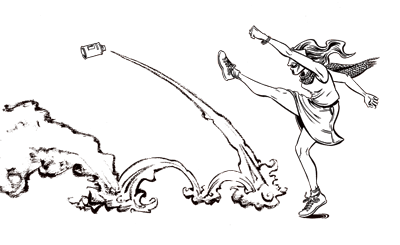While my friend Dylan Meconis is at San Diego Comic-Con, I am taking care of her cats and dog. The first printed volume of Dylan’s excellent webcomic Family Man just came out, and I’ve gotta say, it works much better as a tactile book than a website. (Though the Family Man website, with it’s flaking pages and trompe l’oeil accessories is probably as close to being tactile as anything on the internet. She gave me great WordPress advice for this site, and maybe some day I will implement more of it.)
I could write a whole list of reasons why Family Man is such a good comic (through-composed, novelistic scope; amazingly rigorous historical research; costume porn), but one reason stands out for me personally: it is an honest treatment of Characters Who Are Intellectuals. This is actually something I care a lot about. There are way, waaay too many stories out there about college professors, architects, classical composers, writers (oh, writers!), world-renowned anthropologists/violinists etc. etc. where the main thrust of the entire narrative seems to taunt “See? See? Beneath all his pretensions of intellectual superiority, he is just a regular shmoe like anyone else! In fact worse! He cheats on his wife and sleeps with his students and gets drunk and wakes up in the morning and looks at his own haggard, stubbly face in the metaphorical bathroom mirror!”
As much fun as it might be to take this strawman out of the attic for a good whacking session now and then, it’s a tremendous missed opportunity. Intellectuals, as a class, have pretty unique and interesting internal lives of a specific sort not necessarily found in the middle- or working- class hero. When the protagonist is a scholar, when he lives in the realm of ideas, the writer has the chance to create a true novel of ideas, a work in which the characters and plot can serve as a playground (or battleground) for abstract theories or beliefs in a particularly raw, even allegorical, way. At the end of a great story-about-intellectuals, such as the movie Pi or the book Elizabeth Costello, we find ourselves worried less about what will actually happen to the character (will Max Cohen be captured by the Wall St. goons or the radical Hassids? will Elizabeth live long enough to reconcile with her family?) than by what direction their thoughts take (can Max’s capacious brain discern an underlying order to the universe? can Elizabeth’s atheism coexist with her belief in the positive existence of Evil?) Back to Family Man: though I’m somewhat interested to see which characters turn out to be werewolves, I’m on the edge of my seat waiting to see if Luther Levy fully accepts atheism or regains his religion.
And this doesn’t necessarily have to be deadly serious. Without belaboring the topic too much longer, this relates to what I tried to do with “Apostrophobia,” my regular funny cartoon in the Columbia Spectator. Tired of the “college humor” whose basic joke was that, for all our academic pretensions, college students are basically lazy, indulgent, sex-crazed, alcoholic morons (the “VanWilder” school of comedy), I tried to invert the joke and show that the most hilarious thing about Columbia students was our very commitment to academia, that we voluntarily withdrew from contemporary society at large – and in many cases, from the contingent realm itself – to immerse ourselves in a universe of total abstraction. Engineers excepted.
I recently found a passage where Slavoj Žižek stole my idea and expressed better:
“[I]t is true that the space of the comic is the space between the dignified symbolic mask and the ridiculous vulgarity of ordinary life, with its petty passions and weaknesses; the properly comic procedure, however, is not simply to undermine the dignified mask (or task or sublime passion) through the intrusion of everyday reality, but enact a kind of structural short circuit or, rather, exchange of places between the two in which the very dignified mask/task/passion appears as a pathetic idiosyncrasy, an utterly human weakness.”
By the way, with all this high-fallutin’ talk, I hope you still do care what happens to Kafir. By now it’s been revealed that the “government guys” who rented all the other rooms in the motel are in fact ICE police, and they’ve got Kafir’s personal hero, Ernesto Alvarez himself! Hopefully you caught the mentions of Ernesto on page 5, page 19, and/or page 27 so that his appearance isn’t completely out of the blue.






